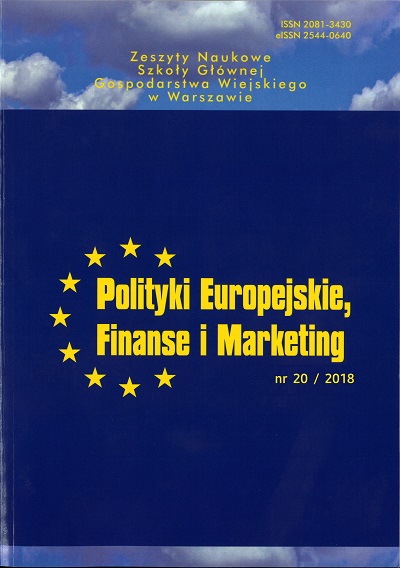Main Article Content
Article Details
Ashworth G.: Planowanie dziedzictwa, Międzynarodowe Centrum Kultury Kraków, Kraków 2015
Ashworth G., Kavaratzis M.: Why brand the future with the past?. The roles of heritage in the construction and promotion of place brand reputations, [w:] International Place Branding Yearbook: managing Reputational Risk, Go F., Govers R., (red.), Londyn 2011 (Crossref)
Ashworth, G., Larkham, P.J. (red.): Building a new heritage: tourism, culture and Identity in the New Europe, London 1994
Augustyn A.: Smart Cities - kierunek rozwoju miast XXI w. w świetle polityki spójności UE [w:] Miasta Polski na początku XXI wieku. Demografia-Współpraca-Samorząd, Dziechciarz T., Krawczyk-Sawicka A. (red.), Katolicki Uniwersytet Lubelski, Stalowa Wola 2013
Braun E., Kavaratzis M., Zenker S.: My city - my brand: the different roles of residents in place branding, Journal of Place Management and Development, 6 (1) 2013 (Crossref)
Brunello A.: Crowdfunding. Podręcznik, CeDeWu, Warszawa 2015
Carman J.: Against Cultural Property: archaeology, ownership and heritage, Duckworth, London 2005
Castells M.: Społeczeństwo sieci, PWN, Warszawa 2011
Eshuis J., Braun E., Klijn E.-H.: Place Marketing as Governance Strategy: An Assessment of Obstacles in Place Marketing and Their Effects on Attracting Target Groups, Public Administration Review, Volume 73, Issue 3, 2013 (Crossref)
Eshuis J., Edwards A.: Branding the City: The Democratic Legitimacy of a New Mode of Governance, Urban Studies, 50(5) 2013 (Crossref)
Fan H.: Branding a place through its historical and cultural heritage: The branding project of Tofu Village in China, Place Branding and Public Diplomacy, November 2014, Volume 10, Issue 4 (Crossref)
Hague L.A.: Identity and place: a critical comparison of three identity theories, Architectural Science Review 1, 2007 (Crossref)
Hankinson G.: Relational Network Brands: Towards a Conceptual Model of Place Brands, Journal of Vacation Marketing, 10(2), 2004 (Crossref)
Hereźniak M.: Place branding and citizen involvement - participatory approach to building and managing city brands, International Studies Interdisciplinary Political And Cultural Journal, Vol. 19, No. 1/2017. (Crossref)
Insch A., Florek M.: Place Satisfaction of City Residents: Findings and Implications for City Branding [w:] Towards Effective Place Brand Management: Branding European Cities and Regions, Ashworth G. J., Kavaratzis M. (red.), 2010 (Crossref)
Jersand E.M.: Inclusive Place Branding. What it is and how to progress towards it, University of Göteborg, School of Business Economics and Law, Göteborg 2016
Kavaratzis M., Hatch M.J.: The dynamics of place brands: an identity-based approach to place branding theory, Marketing Theory, 13(1), 2013 (Crossref)
Kobyliński Z.: Czym jest, komu jest potrzebne i do kogo należy dziedzictwo kulturowe?, MAZOWSZE Studia Regionalne nr 7/2011 23
Kowalik W., Matlak M., Nowak A., Noworól K., Noworól Z., Kultura lokalnie: między uczestnictwem w kulturze a partycypacją w zarządzaniu, Małopolski Instytut Kultury, Kraków 2011
Małachowicz E., Konserwacja i rewaloryzacja architektury w środowisku kulturowym, Wrocław 2007.
Merrilees B., Miller D., Herington C.: Multiple stakeholders and multiple city meanings, European Journal of Marketing, 2012, Vol. 46(7-8) (Crossref)
Otwarte innowacje na pograniczu przemysłów kreatywnych, nauki i biznesu, Warszawa: Fish Ladder, Platige Image, PwC Polska, www.nck.pl/media/attachments/319105/otwarte innowacje-raport.pdf
Rozbicka M.: Zarządzanie Światowym Dziedzictwem Kulturowym, Warszawa: Narodowy Instytut Dziedzictwa 2015, https://www.nid.pl/pl/Wydawnictwa/inne wydawnictwa/Managing Cultural WH_PL% 20(3).pdf
Schaffers H., Komninos N., Pallot M., Trousse B., Nillsson M., Oliveira A.: Smart Cities and the Future Internet: Towards Cooperation Frameworks for Open Innovation, https://wwwsop. inria.fr/teams//axis/pages/bestpaper/FIA2011t.pdf (Crossref)
Sevin H.E.: Understanding cities through city brands. City branding as a social and semantic network, Cities, 38 (2014) (Crossref)
Sobolak D.: Crowdsourcing a digitalizacja - mądrość tłumów w cyfrowej kulturze, http://warsztat.org.pl/wpcontent/uploads/2016/03/ekspertyza_crowdsourcing.pdf
Stawasz D., Sikora-Fernandez D.: Zarządzanie w polskich miastach zgodnie z koncepcją smart city, Placet, Warszawa 2015
Steinberg S.: The Crowdfunding Bible. How to Raise Money for any Startup, Video Game or Project, www.crowdfundingguides.com/The Crowdfunding Bible.pdf
Strycharz J.: Organizacje a rozwój kultury [w:] Hausner J., Karwińska A., Purchla J., Kultura a rozwój, Warszawa: Narodowe Centrum Kultury, http://nck.pl/media/2014-01-21/podrecznik_copy1.pdf
Tythacott L., Arvantis K.: Museums and Restitution: New Practices, New Approaches, Routledge 2016 (Crossref)
UNESCO, Creative Cities Network Mission Statement, 2014 https://en.unesco.org/creativecities/sites/creative-cities/files/Mission_Statement_UNESCO_Creative_Cities_Network.pdf
Vecco M., A definition of cultural heritage: From the tangible to the intangible, Journal of Cultural Heritage, Volume 11, Issue 3, July-September 2010, https://doi.org/10.1016/j.culher.2010.01.006 (Crossref)
Downloads
- Mirosław Wasilewski, Anna Bischoff, THE COOPERATION IN THE EXCHANGE OF TAX INFORMATION BETWEEN POLAND AND OTHER EU COUNTRIES , The Scientific Journal European Policies, Finance and Marketing: No. 19(68) (2018)
You may also start an advanced similarity search for this article.
- Anna Augustyn, Magdalena Florek, Marta Hereźniak, IN SEARCH OF RELIABLE METHODS OF ASSESSING THE EFFECTIVENESS OF PLACE BRANDING ACTIVITIES UNDERTAKEN BY CITIES , The Scientific Journal European Policies, Finance and Marketing: No. 17(66) (2017)

This work is licensed under a Creative Commons Attribution-NonCommercial 4.0 International License.
All articles published in European Policies, Finance and Marketing are fully open access. In this way, the scientific research results contained in articles published in our journal are available to every reader free of charge - in accordance with the CC BY-NC license (https://creativecommons.org/licenses/by-nc/4.0/).
According to the CC BY-NC license you are free to:
- Share — copy and redistribute the material in any medium or format
- Adapt — remix, transform, and build upon the material
The licensor cannot revoke these freedoms as long as you follow the license terms.
Under the following terms:
- Attribution — You must give appropriate credit , provide a link to the license, and indicate if changes were made . You may do so in any reasonable manner, but not in any way that suggests the licensor endorses you or your use.
- NonCommercial — You may not use the material for commercial purposes .
- No additional restrictions — You may not apply legal terms or technological measures that legally restrict others from doing anything the license permits.
Source: https://creativecommons.org/licenses/by-nc/4.0/deed.en
According to that, the authors retain the copyright and full publishing rights.





